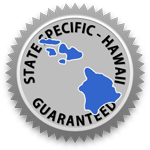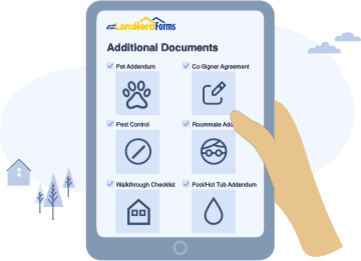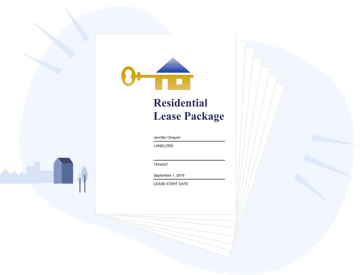Hawaii Lease Agreement with ezSign
Pro Form: Create a Pro Account to access this form
5 Stars
Create and Download the Hawaii Residential Lease & Rental Agreement printable PDF for Landlords. This state-specific Lease is customizable and includes HI laws.
Document Last Modified: 4/24/2024
Document Features
Uses Lease Builder
State-Specific
ezSign
Related Documents
You Won’t Find a Better Online Lease Agreement.
Our Hawaii Lease is EZ to create, EZ to read, and EZ to sign. No wonder so many Landlords keep using our products!
- Over 3 million Leases created since 2006
- Rated “excellent” 4.8 from 5,000+ reviews
- Recommended by Shark Tank’s Barbara Corcoran
Not sure you’re ready to commit? You can always start by creating a FREE Lease or signing up for a FREE Account!
Table of Contents
- Hawaii Residential Lease Agreement
- Hawaii Landlord-Tenant Laws
- Required Disclosures
- Frequently Asked Questions
- Hawaii Rental Forms and Templates
- Other State Lease Agreements
- Create Hawaii Lease Agreement

Rated “excellent” 4.8 from 5,000+ reviews on Trustpilot
Watch Our Videos
▶ This is Why a Lease is so Important
▶ How to ezSign your Lease Agreement
Video to Share with Tenants
Hawaii Residential Lease Agreement

Our Hawaii Lease is guaranteed to comply with all Hawaii Lease laws and EZ to create online in minutes. Here’s how:
- Follow user-friendly prompts to customize your Lease Agreement.
- Get State Assist tips that point out important state laws.
- All Hawaii-required terms, clauses, and disclosures are AUTOMATICALLY included in your Lease.
- Add disclosures, addendums, or additional documents with just the click of a box.
- Review and sign your Lease Agreement entirely online with ezSign.
- Once it’s signed, your Lease is automatically stored securely on the cloud with ezCloudStorage.

Pro Tip: We have over 25 addendums and additional documents that Landlords can add to their Lease. This means a more customized Lease Package and better rental outcomes!
Hawaii Landlord-Tenant Laws
Our Hawaii Lease Agreement is guaranteed to comply with all Hawaii Lease laws. That means you don’t need to worry about state laws when drafting your Lease Agreement.
Even so, we know Pro Landlords need to be familiar with state Lease laws while managing their rental property!
| Category | State Law |
|---|---|
| Ending and Renewing |
Month-to-Month Tenancy: Either the Landlord or Tenant may terminate the Rental Agreement with proper notice. It is not necessary to give any reason for the termination. Landlords - When the Landlord wishes to terminate the tenancy, the Landlord must give the Tenant written notice no less than 45 days before the anticipated termination date. The Tenant may vacate the unit at any time within the 45 days and is responsible for payment of prorated rent for the period that the premises are occupied and for notifying the Landlord of the day of vacating. Tenants - When the Tenant wishes to terminate the tenancy, the tenant must give the Landlord written notice no less than 28 days before the anticipated termination date. The Tenant is responsible for payment of rent through the date stated in the termination notice, or through the date, it is re-rented, whichever comes first. Fixed-Term Rentals: Rental Agreements for fixed terms have a termination date stated in the agreement. Termination is automatic and there is no notice required unless specified within the Lease. |
| Security Deposit |
The security deposit may not exceed an amount equal to one month's rent. The Landlord and Tenant may agree upon the collection of the last month's rent in advance but this must be in writing. A Landlord may demand a security deposit for a pet. This does not apply to assistance animals. |
| Returned Payment Fee | Assessed fees may not be more than $30 and must be reasonably related to expenses the Landlord incurs as a result of a returned payment or should apply to the actual charges the Landlord receives from the bank. |
| Late Fee | Hawaii now caps late payment fees at eight (8) percent of the amount of rent due. |
| Insurance Requirements | Landlords may require Tenants to obtain rental insurance. |
| Notice to Enter | Landlords are required to give at least 2 days' notice to enter the Leased Premises. |
| Landlord Requirements |
HRS Section 521-37 Subleases and assignments states: (a) Unless otherwise agreed to in a written rental agreement and except as otherwise provided in this section, the Tenant may sublet the Tenant's dwelling unit or assign the rental agreement to another without the Landlord’s consent. Non-Refundable Fees: The Landlord may not require or receive from or on behalf of a Tenant at the beginning of a Rental Agreement any money other than the first month's rent, last month’s rent if agreed upon in writing, and a security deposit. |
Contact your local housing or zoning office to be sure your rental property complies with city and county requirements for inspections, rent control, occupancy limits, property codes, and zoning. Many cities and counties require inspections and registrations and have specific maintenance regulations.
Required Disclosures
- Landlord/Agent Identification: The Landlord must identify any person or persons allowed on the premises for management or maintenance. In addition, Landlords must provide their tax excise number to Tenants so that Tenants may file for a low-income tax credit if they qualify.
- Lead-Based Paint Disclosure: Pursuant to federal law, if the Rental Unit was built before 1978, occupants must be provided with a lead-based paint disclosure.
- Property Condition Form: Before signing a Lease Agreement, the Landlord must provide renters with a copy of the condition of the property. This should include the condition of any provided furnishing or appliances. Our Move-In/Move-Out Walkthrough Checklist can be customized to ensure that the condition of all areas of your property is documented.

All required disclosures are AUTOMATICALLY included in our Lease Agreement!
Have other disclosures you’d like to include? We have over 25 that you can add to your Lease Package with just the click of a button!

Frequently Asked Questions
Does a Hawaii Lease Agreement need to be notarized?
No, Lease Agreements do not need to be notarized in Hawaii. As long as the contract meets the requirements of a Lease and is signed by both parties, it’s considered legally binding and fully enforceable.
What is the standard Lease term in Hawaii?
The standard Lease term is one year (12 months). However, shorter and longer Lease terms are recognized in the state as long as the term is agreed upon by both parties. This means you can choose a shorter or longer Lease term, for example, a month-to-month Lease Agreement, a short-term Lease Agreement, or a Vacation Rental Agreement.
Who needs a Lease Agreement in Hawaii?
Anyone who rents real estate needs a Lease Agreement. This is key for setting the terms of the rental relationship and protecting the Landlord, or lessor, if problems arise. This is true whether you rent a single-family home, apartment, duplex, or condo.
You have a lot invested in your rental, so you should never hand over possession of your property without a signed Lease in place.
What should be included in a Hawaii Lease Agreement?
The Lease needs to address all basic terms of the rental relationship - like the name and contact information for both parties, the Lease term, the rent amount, security deposit information, and late fee policies.
In addition, the Lease needs to comply with all Hawaii Lease laws, including all state-required terms and disclosures, and address any unique rules or policies of the rental.
Drafting a Lease Agreement is complicated, so it’s never a good idea to write your own Lease Agreement unless you’re familiar with the applicable Lease laws and have experience drafting Leases. There are some basic, simple Lease Agreements available online that Landlords can start with. However, these tend to be generic, fillable blank forms. This means that they can’t be customized to each Landlord’s needs and usually means they don’t address specific state laws.
There are some state-specific basic Lease forms, like the one offered by the Hawaii Association of Realtors, but these forms still can leave Landlords without the protection they need.
To set yourself up for success and ensure your property is protected, it’s vital to use a CUSTOMIZABLE, state-specific Lease Agreement.
How should I store my Hawaii Lease Agreement?
There are a number of effective ways to store your Hawaii Lease so that it’s accessible and secure. Our Lease Agreements are automatically stored securely on the cloud using ezCloudStorage. In addition, they’re EZ to print so that Landlords have a hard copy. Finally, they are also EZ to download to save as a PDF.
We know Landlords like options, so we’ve given them plenty!
What is the maximum rent increase in Hawaii?
There is no rent control in Hawaii, so rent can be increased by any amount. It’s important to make sure that your Lease Agreement clearly states the Lease amount, the Lease term, and the notice requirements for raising the rent
How often can a Landlord raise the rent in Hawaii?
Hawaii Landlords can increase the rent as frequently as they want as long as they give proper notice. For weekly Lease Agreements, Landlords must give at least 15 days’ notice. For month-to-month Lease Agreements, Landlords need to give at least 45 days’ notice.
Other Popular Forms
The Lease Agreement is only one of the forms that Hawaii Landlords need. That’s why we have documents for the entire Landlord Lifecycle.
- Rental Application: Our Free Rental Application makes it EZ for Landlords to gather important information about Applicants. It also can be used to initiate complete Tenant Screening, which includes a credit report, criminal history background report, ResidentScore, and eviction history report. Start your screening or view sample reports here.
- Tenant Welcome Letter: Customize this letter to provide renters with important information about their new home and to welcome them to your rental unit.
- Rent Ledger: Use the rent ledger to record payments and to properly document any missed payments.
Hawaii State Specific Documents
- Hawaii 5 Day Notice to Pay Rent: This notice should be used for Tenants that have fallen behind on rent payments. It’s a necessary first step in the eviction process.
- Hawaii 10 Day Notice to Cure: This notice should be used for a Lease violation other than nonpayment of rent. It’s a necessary first step in the eviction process.
- Hawaii Official Landlord Tenant Complaint (1st Circuit): This is the document Landlords on the Island of O’ahu should use to initiate eviction proceedings.
- Hawaii Official Landlord Tenant Complaint (2nd Circuit): Landlords in the 2nd Circuit, which includes Maui, Molokai, Lanai, Kahoolawe, and Molokini, shoulduse this document to start the eviction process.
- Hawaii Official Landlord Tenant Complaint (3rd Circuit): Landlords on the Island of Hawaii should use this complaint to start an eviction.
- Hawaii Official Landlord Tenant Complaint (5th Circuit): Landlords in Kauai and Niihau should use this form to initiate eviction proceedings.
- Hawaii Landlord-Tenant Handbook: This user-friendly resource outlines Landlord and Tenant rights and serves as a helpful tool for Hawaii Landlords.
Need another form? Search our library of over 400 property management forms!
Other State Lease Agreements
The Lease Agreement needs to comply with the state laws where a rental unit is located. This means that if you have a property in more than one state, you need more than one Lease Agreement. Thankfully, we’ve got them all!
- Arizona Rental Contract: The EZ way to create the complete Lease Package.
- California Residential Lease Agreement: Our CA Lease is guaranteed to comply with all of California’s complex Lease laws.
- Nevada Lease Agreement: Customize your Nevada Rental Contract online in less than 15 minutes.
- Oregon Residential Rental Agreement: Enjoy unlimited access to our electronic signing tool, ezSign.

Need another state’s Lease Agreement? We’ve got it!
Create Hawaii Lease Agreement
It only takes about 15 minutes to customize a Lease that is guaranteed to comply with all Hawaii Lease laws.
Plus, it can be signed electronically and is automatically stored securely on the cloud with ezCloudStorage.
Everything Landlords need to make Lease-building EZ!

